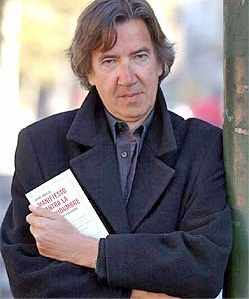
St. Augustine is credited with giving clear expression to the Christian prohibition of suicide. He saw this prohibition as a logical extension of the fifth command- ment: "thou shalt not kill". St. Thomas Aquinas later elaborated on Augustine, and I believe the basic idea so many of us learn as children–that suicide is contrary to God's will, is taken from Aquinas. (In reviewing thinking on suicide I've referred to the Stanford Encyclopedia of Philosophy.) The ethics of suicide is a fascinating topic in some ways, and it's something I've been grappling with in the context of the recent death of Cuban dissident Orlando Zapata. And it continues to concern me as I read about the fate of dissident Guillermo Fariñas, who was hospitalized the other day.
But today I am much more concerned and troubled by the spate of suicides at Cornell. Two students jumped to their deaths on consecutive days this past week. It's been three in the past month, and at least four this academic year. Something is going terribly wrong. Yesterday I was thinking about this, trying to reflect on my own role as a teacher, to re-identify my obligations to young people.
I have not read a lot about suicide, but enough to know that individuals struggling with depression are at much greater risk. According to Gayla Martindale, the number one cause of suicide is untreated depression. I wonder: does academic stress and/or failure aggravate depression? Common sense suggests that it would. (I can envision the terrible circle: stress itself can lead to poor academic performance, which in turn leads to more stress, thus poorer performance, and around and around...) Of more interest to me however is this question: is academic failure really a failure?* And if so, whose failure is it? I was trying to see things through the lens of priorities. Students get stressed because they want to succeed, and they fear the consequences of not succeeding. This is simplifying things some, no doubt, but that scenario is lived out again and again. We all go through it, of course, not just students. Fortunately, the great majority of us have a sufficiently healthy perspective so that the stresses we go through do not overwhelm us completely. It's very difficult to imagine, for example, that someone could take their own life simply because they had failed an exam or feared they were about to fail an exam. But I'm not a mind reader. I suspect those individuals who do take their lives are deeply troubled, sometimes struggling with debilitating mental illness. (That's a hard one: it seems to me that suicide is in itself, a symptom of severe mental illness, because a mentally healthy person could not, by definition, kill oneself.) In any case, I keep coming back to the same thought: an act of suicide represents a profound failure. A failure, ultimately, to connect, to communicate. Something I try to communicate is: so you failed an exam. And...? What does it mean? It probably suggests that you didn't prepare well. And if you didn't prepare well, it might suggest that you're not really that interested in the topic. And if you don't feel passionate about the topic, maybe we should think about finding other topics, or looking at the topic in question in a different way. Whatever the failed exam means, it certainy does not mean failure. So, *, no, academic failure is not really a failure. Failure, for me, is when the very idea of learning is seen as fruitless, as unworthy of time and attention. Don't we want to learn about ourselves? In my case, it sometimes seems hopeless, (Knock, knock, anyone home?), but I'm determined to keep trying. It's fun! And I'm definitely interested in fun. (In the image, Thomas Aquinas, by Francesco Solimena.)
 On Friday after- noon Asun and I were walking to the car when Asun got hit by a hard falling acorn. Ouch. It's that time of year. Yesterday we were hiking along the Appalachian Trail and I was feeling deeply affected by the season's warnings: life ends. warm to cold, green to brown, moist to dry. What to do? How to respond? Acorns were falling to my left, to my right. Then, kaplut, one fell right in front of me. Damn, am I being spoken to? And then, right on cue, Waldo stumbled badly. As he regained his balance he looked up at me, as if acknowledging, yes, I'm getting old, I'm reading your mind. But it was a sunny morning, too, and we just kept on hiking. The darkness wasn't real. I'd like to be ready for that darkness. Maybe it will help if I think of myself as an acorn. I'll get recycled.
On Friday after- noon Asun and I were walking to the car when Asun got hit by a hard falling acorn. Ouch. It's that time of year. Yesterday we were hiking along the Appalachian Trail and I was feeling deeply affected by the season's warnings: life ends. warm to cold, green to brown, moist to dry. What to do? How to respond? Acorns were falling to my left, to my right. Then, kaplut, one fell right in front of me. Damn, am I being spoken to? And then, right on cue, Waldo stumbled badly. As he regained his balance he looked up at me, as if acknowledging, yes, I'm getting old, I'm reading your mind. But it was a sunny morning, too, and we just kept on hiking. The darkness wasn't real. I'd like to be ready for that darkness. Maybe it will help if I think of myself as an acorn. I'll get recycled.

















